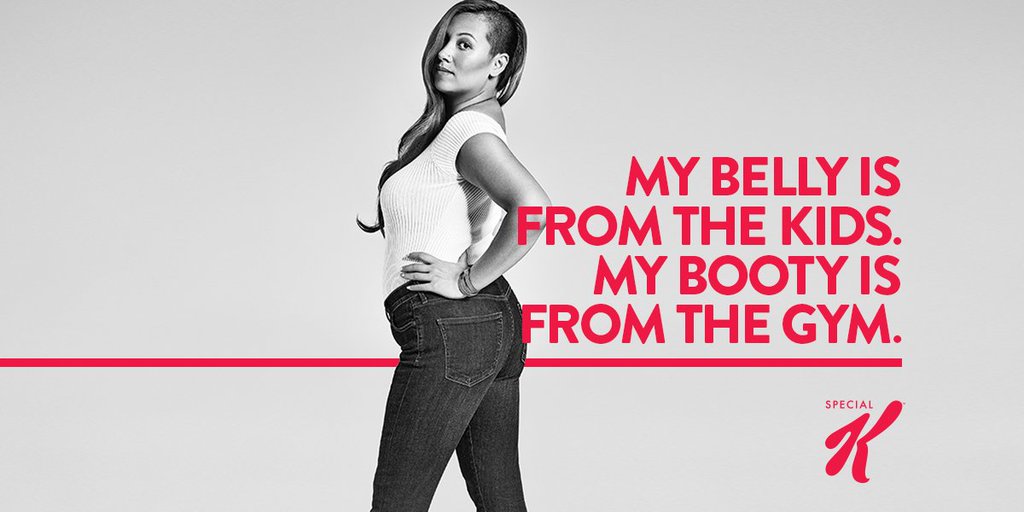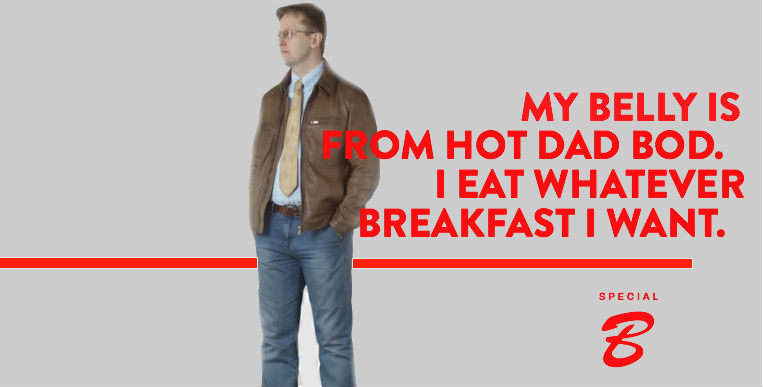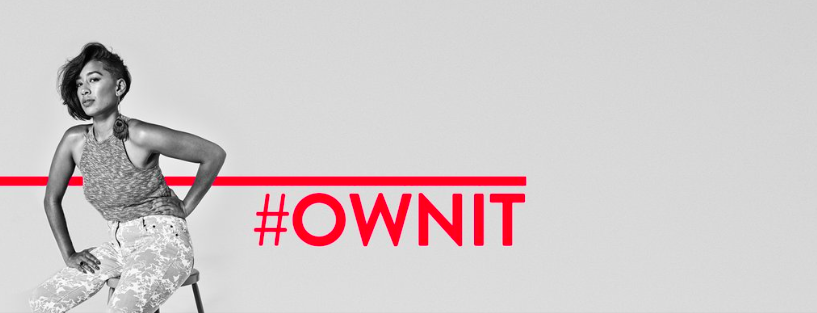Original ad: Special K
From the #OWNIT campaign, pulled from Twitter.

“Let’s focus on stuff we can actually change, instead of stuff we can’t. What if we were nicer to ourselves and put good things into our bodies. Let’s be perfectly imperfect. Let’s take a good long look in the mirror and proudly… own it all.” Special K’s #OWNIT video ad, [0:37 – 0:58].
This is the rallying cry from Kellogg’s Special K cereal. Attempting to steer away from its diet-focused past, the newly empowered Special K is coming at women with a seemingly body-positive message to connect with them emotionally, online. The #OWNIT campaign aims to help women embrace their body flaws or inherited imperfections, while also celebrating their more attractive qualities — the ones they worked hard for, and “earned” or “perfected” through diet and exercise. Following the trendy push towards “strong is beautiful”, this series of ads is akin to Dove Real Beauty, by simultaneously embracing women and pushing products through that message of empowerment. Like the Dove ads, Kellogg’s is telling women that their worth comes from their (imperfect) external appearance.
Like Slavoj Zizek explained in the Ethics of Consumption, this is a prime example of the disingenuous way that neoliberalism pushes brands to take on values and feelings, in order to get an emotional buy-in from consumers. Kellogg’s is attempting to sway the public into feeling a strong emotional connection, then illicit a false deficit inside of women (body image), in order to create a need (perfection) to purchase a product (Special K). Special K wants women to feel emotionally connected to the brand through false empowerment, while remaining insecure enough to keep perfecting their bodies. Women will help the ad go viral by sharing emotional stories carrying the #OWNIT hashtag, and finally, reward the brand by consuming their diet cereal.
Kellogg’s is basically saying that women need a diet cereal to empower them — diminishing and diluting the true concept of empowerment by turning it into something that can be purchased.
In terms of empowerment, imagining little girls turning on their tvs to see a grown woman say “97% of women hate their bodies” seems like a damaging kind of methodology — one that will ultimately put the seed of negative self talk into impressionable young minds.
In addition, this ad is strikingly heteronormative and conforms to gender stereotypes. The woman in this ad is also reduced to a mother archetype — proud of her kids, yet ashamed of how pregnancy has affected her body. On top of this, the ad sets an artificially high standard for weight by having the woman lament her “belly”, when in reality she is an attractive, fit model.
This ad also falsely suggests that a woman could actually be strong, healthy, and work out while consuming Special K. The cereal comes in at a mere 120 calories per bowl, has sugar as its third ingredient, and contains little in the way of actual natural nutrition, aside from added vitamins. If a woman was going to put “good things into her body” as the ad suggests, she would not likely be eating this highly processed product.
For a wider view of the Special K #OWNIT campaign:
Culture jammed: “Special Bro”

The jammed ad, Special Bro, illustrates the double standards we apply to male and female bodies, especially within the media. While the woman in the Special K ad laments the changes her body has undergone through the miracle of giving life, this father can accept his less-than-perfect abs by sloughing off his imperfections to the attractiveness of “dad bod” — a muscular, yet slightly overweight body.
This ad also highlights the absurdity of dad bod as a concept, seeing as there is no female equivalent. The only “mom bods” that are celebrated are the highly attractive, fit ones, i.e.: the “milf” or “yummy mummy” — not a mom who has happily let herself go / wears elasticized “mom jeans” paired with sweatshirts with bedazzled, appliqué Disney cats on them. Generally, moms receive pressure to maintain their looks and physique after having children (“bouncing back”), while dads are celebrated when taking on a stereotypically masculine, relaxed shape.
These types of advertising reinforce heteronormative society and push the gender binary through sexist stereotypes. Ads targeting male body image are all about bulking up, while female ads use exercise as the new code word for dieting. Although men may be pressured to be fit and strong, they do not face condescending hashtag campaigns from diet cereals galvanizing them into self-acceptance while simultaneously pointing out their body flaws.
This jammed ad also highlights how cysgendered, hetero white men do not generally need to ask permission to take up space in the world. The man depicted in the ad is not particularly fit or attractive, yet he is fine with how he is — society accepts his body, and he feels no need to perfect himself through exercise and diet. He can eat whatever he wants.
Ads aimed at women tend to point out insecurities, or depict two women tearing each other down. In contrast, ads aimed at men tend to inflate the male ego, are built upon praise, and appeal to men’s ideas relating to dominating or succeeding.
These double standards in advertising are used by marketing companies to sell products, but ultimately these sexist stereotypes influence and reinforce these same stereotypical and sexist gender roles that are pervasive within our society.
What came first? The reflected gender stereotype, or its reinforcement by a multinational, gendered diet cereal? Either way… it’s highly unlikely that Special K will #OWNIT.
References
“Dad bod.” Wikipedia. Wikimedia Foundation, 03 June 2017. Web.
“Dove Campaigns.” Dove US. Web. https://www.dove.com/us/en/stories/campaigns.html
Ethics of Consumption – cultural capitalism. Slavoj Zizek. 2011. https://www.youtube.com/watch?v=GRvRm19UKdA
Kellogg’s Special K. Twitter feed. Web. <https://twitter.com/specialk_ca>.
#OwnIt. YouTube, 20 Sept. 2015. https://www.youtube.com/watch?v=aAVFCH9x7Og
Special K* cereal nutritional information. Web. <http://www.kelloggs.ca/en_CA/special-k-original-cereal-product.html>.
